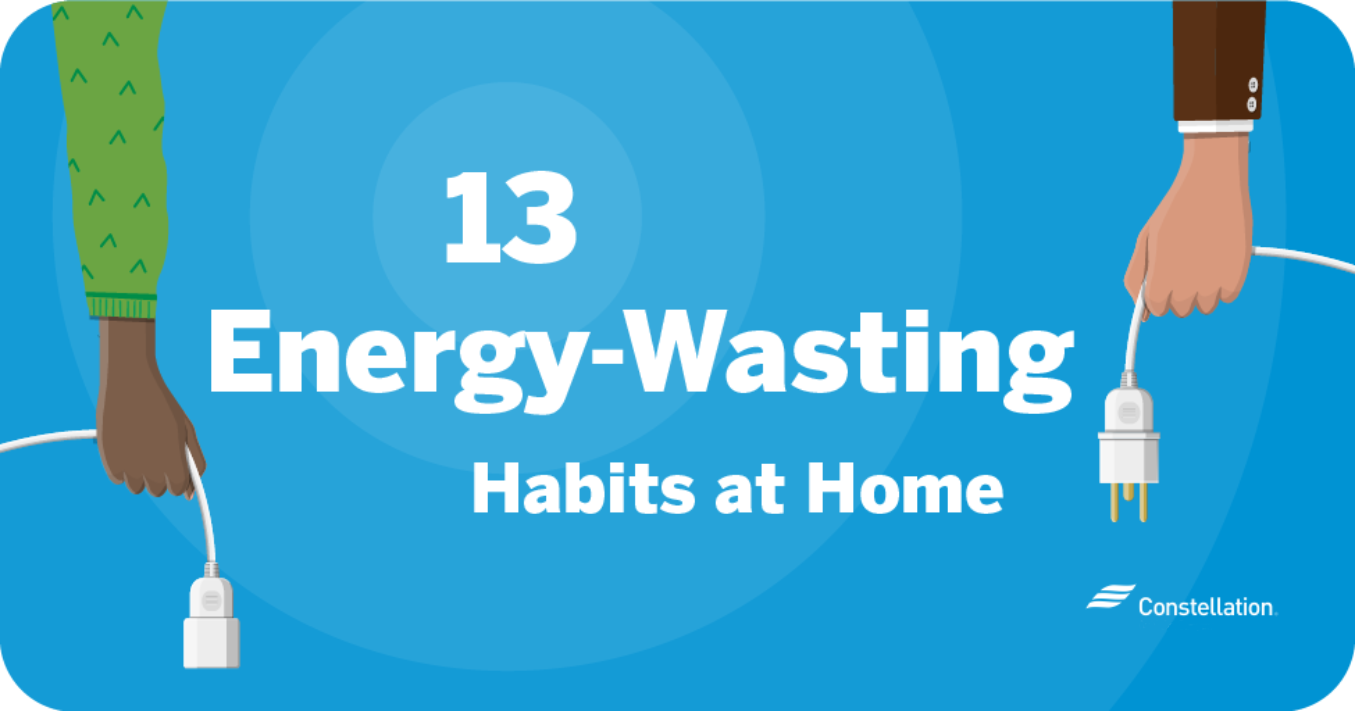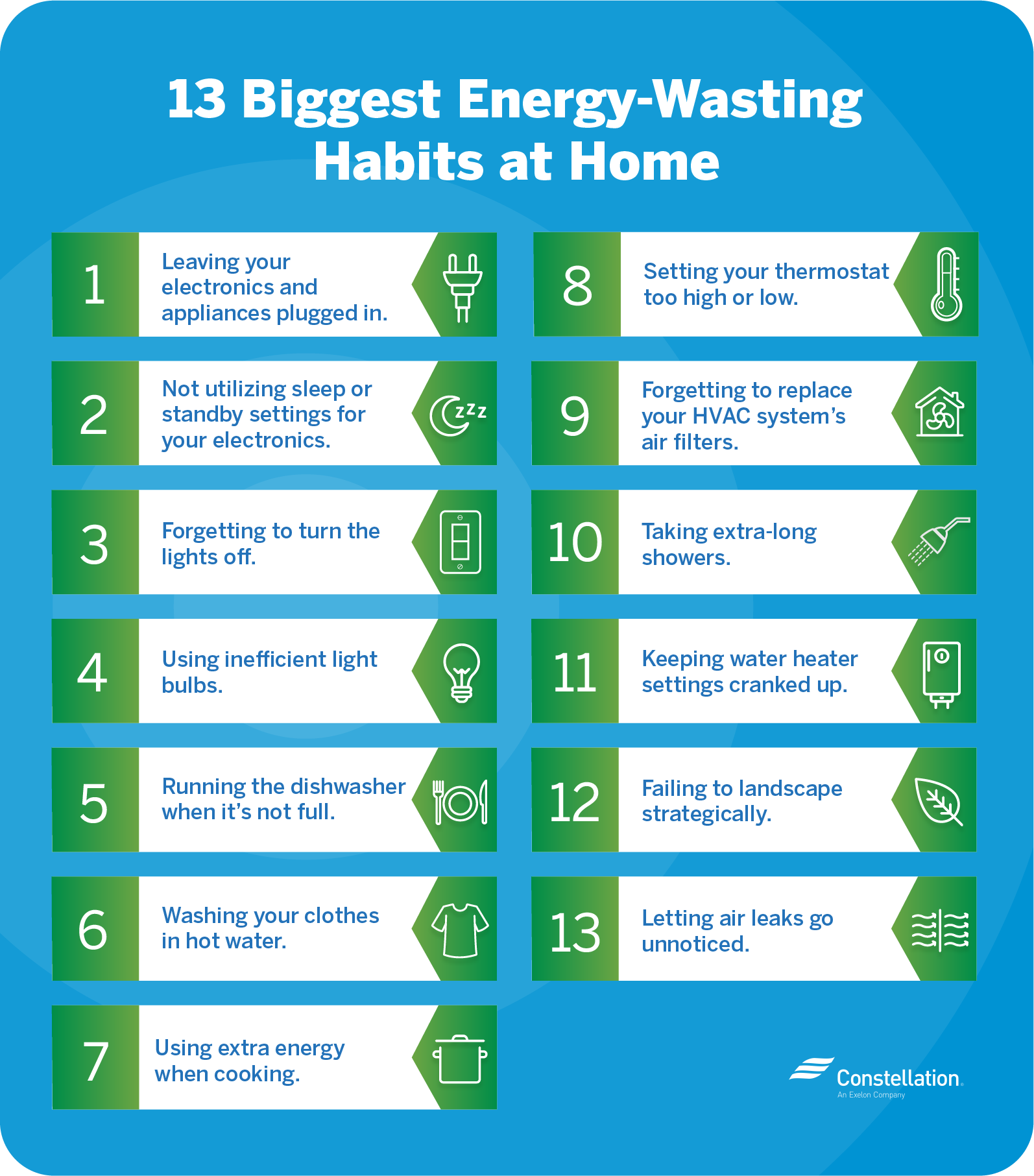
- Category:
Home Energy Savings -
Last updated:
March 28, 2022
13 Ways You Are Wasting Energy at Home
Wasting electricity at home is something many of us do without realizing it. If we don’t understand what wastes the most electricity in a home, it’s easy to use more than we need.
But now some good news: Many of the biggest energy-wasting habits at home are easy to change, including the 13 listed below. And when you stop wasting energy at home, you benefit in many ways — from possibly lowering your bill to protecting the environment to extending the life of your household appliances.

1. Leaving your electronics and appliances plugged in.
How does leaving something plugged in use electricity if it’s turned off? The answer is “vampire draw,” also known as phantom load or standby power. Standby mode can use more energy than you think. Calculating how much energy is wasted at home in this way, the Department of Energy states that devices that use standby power account for up to 10% of your electricity use.
Things that have a continuous electronic display like a clock and that are operated with a remote control are often the biggest culprits. Electronics fall into this category. For instance, you can stop wasting energy at home by not leaving your computer on once you’ve finished using it. Turn it all the way off and then go a step further by unplugging it. Unplugging devices when not in use is the surest way to prevent energy loss at home.
Another idea: Cut gaming console energy consumption by plugging it and your television or monitor into a power strip. You can do so with any group of electronic devices that are used together. That makes it easier to prevent phantom load in several devices at once by giving you one off switch and one cord to unplug for the whole group.
2. Not utilizing sleep or standby settings for your electronics, as a backup.
While it’s better to switch off (and even unplug) a television when you’re done watching, a sleep setting can come in handy. Leaving devices on and forgetting about them is one of the biggest energy-wasting habits at home. And having a device in sleep or standby mode uses less electricity than having it completely on.
Many devices have a sleep or standby feature that turns them off after a certain amount of time. If you like to fall asleep with the television on, you can set it to switch off after a set amount of time. You can still fall asleep to the TV, but not waste energy keeping it on all night.
3. Forgetting to turn the lights off.
Does leaving a switch on waste energy? It can. Turning off lights saves energy. Another of the biggest energy-wasting habits at home is leaving lights on in empty rooms. It’s easy to walk out of a room and forget about hitting the off switch.
While the average cost to keep a 100-watt incandescent bulb on for 10 hours is only about 12 cents, waste is still waste. And waste adds up. If you’re going to be out of a room for more than 15 minutes, turn off the lights.
One of the benefits of smart home systems is that you can program lights to turn on and off at certain times. And if you forget and leave the lights on, you can switch them off from your phone.
4. Using inefficient light bulbs.
Today’s lighting technology offers dozens of alternatives to incandescent light bulbs. Compact fluorescent light (CFL) bulbs, for example, have been around for decades. They now weigh less and offer a range of light colors. Best of all, they use anywhere from 65% to 80% less energy than incandescent bulbs.
Light-emitting diode (LED) bulbs use even less energy, plus they last for tens of thousands of hours. Whichever bulbs you choose, look for those that have an ENERGY STAR ® rating for the most efficient options.
5. Running the dishwasher when it’s not full.
Even efficient dishwashers can use up to 270 kWh of electricity per year. That doesn’t include the cost of the hot water. Reduce dishwasher power consumption by running your machine only when it’s full. You’ll run it less often and use less electricity.
Another way to stop wasting energy at home is to use the “economy” setting. It allows you to air-dry dishes instead of the energy-intensive “heat-dry” option.
6. Washing your clothes in hot water.
How do we waste energy at home? Oftentimes, it’s something as simple as washing clothes in hot water. In most cases, warm or cold water will get your clothes just as clean.
While tough odors and some oil-based stains can best be removed with hot water, your average wash will get just as clean in cold. With this laundry energy-saving tip, you’ll conserve electricity. Plus, you can extend the life of your clothes: Cold-water washes prevent shrinking, are easier on fibers and minimize fading.
7. Using extra energy when cooking.
You can save time and energy when you prepare the day’s meals all at once. Turning your stovetop and oven on several times a day increases energy consumption, as you heat up the appliance each time. Save energy while cooking with meal prepping, preparing several things at the same time and cooking in batches.
8. Setting your thermostat too high or low.
If you set your thermostat and forget about it, you’re wasting electricity at home because inside temperatures vary through the day and by room. When the sun shines in, rooms can get overheated. If no one is in bedrooms during the day, your HVAC system may be working harder than it needs to.
You can avoid that problem with a programmable smart thermostat that uses energy-efficient smart home apps to learn the patterns of your household. Set it to warm or cool the house just before you get home from work. Lower the temperature while you sleep to save in winter. Fine-tuning your thermostat is one of the smart home energy-saving strategies that can cut your energy use without sacrificing comfort.
9. Forgetting to replace your HVAC system’s air filters.
Failing to replace the air filters on your furnace can lead to wasting electricity at home. When air filters get clogged with dirt, your HVAC system has to work harder to push air through them. The increased load can cause your system to wear out faster and break down when you need it the most.
In addition to changing air filters, make sure to clean air ducts every few years. If you have central air, you’ll help keep your whole system running dependably and efficiently.
10. Taking extra-long showers.
Running hot water for long periods is another waste of energy that you can avoid with small adjustment to habits. Frequent long, hot showers drain your hot water heater so it must use additional energy to heat a new tank full of cold water. Save energy in your bathroom with shorter showers, ideally with a low-flow shower head, to cut energy use.
11. Keeping water heater settings cranked up.
Most hot-water heater settings default to 140 degrees Fahrenheit. Turning your hot water thermostat down to 120 will save energy, prevent wear and tear and keep your family safe. Your water will be hot enough for bathing and washing dishes and clothes, but you’ll reduce the danger of scalding. Plus, the lower temperature slows mineral buildup and reduces corrosion.
Your water heater won’t work so hard and will last longer. Newer models are much more energy efficient. An ENERGY STAR ® water heater can save enough to pay for itself.
12. Failing to landscape strategically.
Many people aren’t aware how landscaping and plantings can affect their home energy use. The U.S. Department of Energy estimates that shrubs and trees that form windbreaks or provide shade can cut energy consumption in your home by as much as 25%. And keeping bushes trimmed in the winter will maximize the warming sunlight in your home that can help cut your heating bill.
13. Letting air leaks go unnoticed.
Identifying sources of drafts is one of the best strategies for how to prevent energy loss at home. Windows and doors can let in plenty of cold air in winter if not properly insulated or leak cool air into the heat during summer. Also check where utilities, like cable, electric and water come into your home. Caulk around these areas to plug leaks.
You can often discover drafts by feel. Alternatively, use a candle. When it flickers, track down the source of the air blowing in. But the surest way to find leaks is by getting a professional to conduct an energy audit that can help you identify and prioritize problem areas.
When you stop wasting electricity at home, you gain so much. You can cut your energy bill, contribute to a cleaner environment, extend the life of your appliances and enjoy a more comfortable home year-round.




